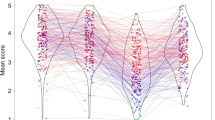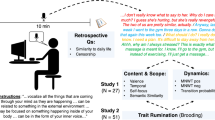Abstract
In spite of the widespread belief of cognitive behavior therapists and researchers that irrational thinking underlies much human psychological suffering, there is little if any direct evidence bearing on the assumption that people think in particular ways when confronted with stressful situations. A paradigm is proposed that appears capable of providing information about people's articulated thoughts as they occur in highly structured, experimenter-controlled situations. The results from an initial experiment indicate the utility of the paradigm in collecting data on how people think under both stressful and neutral conditions. The paradigm seems to offer great flexibility in examining thought processes under a wide range of conditions of interest to psychopathologists and cognitive researchers.
Similar content being viewed by others
References
Bandura, A. Self-efficacy: Toward a unifying theory of behavioral change.Psychological Review 1977,84 191–215.
Beck, A. T.Depression: Clinical, experimental and theoretical aspects. Philadelphia: University of Pennsylvania Press, 1967.
Cacioppo, J. T., Glass, C. R., & Merluzzi, T. V. Self-statements and self-evaluations: A cognitive-response analysis of heterosocial anxiety.Cognitive Therapy and Research 1979,3 249–262.
Craighead, W. E., Kimball, W. H., & Rehak, P. J. Mood changes, physiological responses and self-statements during social rejection imagery.Journal of Consulting and Clinical Psychology 1979,47 385–396.
Davison, G. C. Differential relaxation and cognitive restructuring in therapy with a “paranoid schizophrenic” or “paranoid state.”Proceedings of the 74th Annual Convention of the American Psychological Association. Washington, D.C.: American Psychological Association, 1966.
Davison, G. C. Systematic desensitization as a counterconditioning process.Journal of Abnormal Psychology 1968,73 91–99.
Davison, G. C. Homosexuality: The ethical challenge.Journal of Consulting and Clinical Psychology 1976,44 157–162.
Davison, G. C. Not can but ought: The treatment of homosexuality.Journal of Consulting and Clinical Psychology 1978,46 170–172.
Dollard, J., & Miller, N. E.Personality and psychotherapy. New York: McGraw-Hill, 1950.
Ellis, A.Reason and emotion in psychotherapy. Secaucus, New Jersey: Lyle Stuart, 1962.
Ellis, A. The basic clinical theory of rational-emotive therapy. In A. Ellis & R. Grieger (Eds.),Handbook of rational-emotive therapy. New York: Springer, 1977.
Goldfried, M. R., & Davison, G. C.Clinical behavior therapy. New York: Holt, Rinehart & Winston, 1976.
Goldfried, M. R., & Sobocinski, D. Effects of irrational beliefs on emotional arousal.Journal of Consulting and Clinical Psychology 1975,43 504–510.
Halleck, S. L.The politics of therapy. New York: Science House, 1971.
Hurlburt, R. T. Random sampling of cognitions and behavior.Journal of Research in Personality 1979,13 103–111.
Hurlburt, R. T. Validation and correlation of thought sampling with retrospective measures.Cognitive Therapy and Research 1980,4 235–238.
Hurlburt, R. T., & Sipprelle, C. N. Random sampling of cognitions in alleviating anxiety attacks.Cognitive Therapy and Research 1978,2 165–170.
Jones, M. C. A laboratory study of fear: The case of Peter.Pedagogical Seminary 1924,31 308–315.
Jones, R. G.A factored measure of Ellis's irrational belief system with personality and maladjustment correlates. Unpublished doctoral dissertation, Texas Technological. College, 1968.
Kendall, P. C., & Hollon, S. D. Assessing self-referent speech: Methods in the measurement of self-statements. In P. C. Kendall & S. D. Hollon (Eds.),Assessment strategies for cognitive-behavioral interventions. New York: Academic Press, 1981.
Kendall, P. C., Williams, L., Pechacek, T. F., Graham, L. E., Shisslak, C., & Herzof, N. Cognitive-behavioral and patient education interventions in cardiac catheterization procedures: The Palo Alto medical psychology project.Journal of Consulting and Clinical Psychology 1979,47 48–59.
Klinger, E. Modes of normal conscious flow. In K. S. Pope & J. L. Singer (Eds.),The stream of consciousness: Scientific investigations into the flow of human experience. New York: Plenum, 1978.
London, P.The modes and morals of psychotherapy. New York: Holt, Rinehart & Winston, 1964.
Magnusson, D., & Endler, N. S. (Eds.).Personality at the crossroads: Current issues in interactional psychology. Hillsdale, New Jersey: Erlbaum, 1976.
Mahoney, M. J.Cognition and behavior modification. Cambridge: Ballinger, 1974.
Meichenbaum, D. Cognitive modification of test-anxious college students.Journal of Consulting and Clinical Psychology 1972,39 370–380.
Meichenbaum, D. Self-instructional methods: In F. Kanfer & A. Goldstein (Eds.),Helping people change. New York: Pergamon, 1975.
Mischel, W.Personality and assessment. New York: Wiley, 1968.
Mowrer, O. H. A stimulus-response analysis of anxiety and its role as a reinforcing agent.Psychological Review 1939,46 553–565.
Newmark, C. S., Frerking, R. A., Cook, L., & Newmark, L. Endorsement of Ellis' irrational beliefs as a function of psychopathology.Journal of Clinical Psychology 1973,29 300–302.
Pope, K. S.The stream of consciousness. Unpublished doctoral dissertation, Yale University, 1977.
Rimland, B.Infantile autism. New York: Appleton-Century-Crofts, 1964.
Rimm, D., & Litvak, S. Self-verbalization and emotional arousal.Journal of Abnormal Psychology 1969,74 181–187.
Rosenthal, D. Changes in some moral values following psychotherapy.Journal of Consulting Psychology 1955,19 431–436.
Russell, P., & Brandsma, J. A theoretical and empirical integration of the rational-emotive and classical conditioning theories.Journal of Consulting and Clinical Psychology 1974,42 389–397.
Schwartz, R., & Gottman, J. Toward a task analysis of assertive behavior.Journal of Consulting and Clinical Psychology 1976,44 910–920.
Sutton-Simon, K., & Goldfried, M. R. Faulty thinking patterns in two types of anxiety.Cognitive Therapy and Research 1979,3 193–203.
Vasta, R., & Brockner, J. Self-esteem and self-evaluative covert statements.Journal of Consulting and Clinical Psychology 1979,47 776–777.
Velten, E. A. A laboratory task for induction of mood states.Behaviour Research and Therapy 1968,6 473–482.
Wachtel, P.Psychoanalysis and behavior therapy: Toward an integration. New York: Basic Books, 1977.
Watson, D., & Friend, R. Measurement of social-evaluative anxiety.Journal of Consulting and Clinical Psychology 1969,33 448–457.
Wolpe, J.Psychotherapy by reciprocal inhibition. Stanford: Stanford University Press, 1958.
Author information
Authors and Affiliations
Additional information
This research was supported by NIMH grant MH 24237 and NSF grant BNS-7813054. Frank Durso served as one of the raters in the content analysis of the data, and helpful suggestions came from Donna Andrews and Marvin R. Goldfried.
Rights and permissions
About this article
Cite this article
Davison, G.C., Robins, C. & Johnson, M.K. Articulated thoughts during simulated situations: A paradigm for studying cognition in emotion and behavior. Cogn Ther Res 7, 17–39 (1983). https://doi.org/10.1007/BF01173421
Issue Date:
DOI: https://doi.org/10.1007/BF01173421




